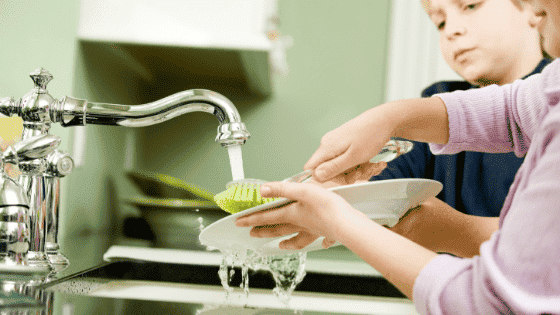How to Manage Chores, a Proven Predictor of Success

When a Harvard study says kids need a chance to practice caring and helpfulness, I’m going to listen. When that same study says chores are a perfect way to do that and they’re a proven predictor of success, I’m going to prioritize chores for my kids. We tackle some legitimate reasons why kids don’t do chores and the science that shows the benefits of kids doing household tasks. We’ll make it easy for you to give chores to kids by age and track them with a free printable chore chart!
Grab our list of age-appropriate chores and a printable chore chart!
I have a distinct memory of (repeatedly) telling my mom that the only reason she had kids was so we could do her chores. I was a mouthy kid, and hearing this nonsense from me must have been maddening.
My mom was a career teacher who loved her job, and she was exceptional at it. When she turned 70, I asked people to send her cards and she received many from former students who credit her with making a lasting impact on their lives. I knew our family was her priority, but I also knew she enjoyed going to work. She navigated us through a devastating family crisis when I was a teen, all while keeping our household together, continuing to excel at work, keeping my brother and me on track at school and extracurricular activities, and staying involved at church.
If my brother and I hadn’t been doing chores for years before all this happened, taking care of everything at home would have been an additional burden for her. I’m sure there were plenty of times when we weren’t exactly helpful and her patience with us was gone, but the foundation of helping around the house was there.
Me with my mom a few months ago
You may never face a family crisis like we did when I was a kid, but I’m pretty sure you could still use some help around the house! Trying to be the best you at work and at home is exhausting, so something needs to give.
“Women believe that we’re supposed to handle everything ourselves, which is often at the root of why we’re unhappy,” says Randy Kamen Gredinger, EdD, a psychologist and life coach. “We do everything, and feel unappreciated, but then we don’t want to ask for help. We need to be more collaborative.”
Don’t wait until you hit your breaking point to communicate your need for some help. As much as we wish it to be true, our husbands and kids aren’t mind readers and unless we’re intentional about saying what we want and need, we will inevitably be frustrated by everyone else’s blissful ignorance of the million racing thoughts that occupy our minds all the time. Nobody can possibly handle it all. It’s not healthy for you or anyone else.
You need help.
You have people in your house who can help you.
Use them.
Reasons Kids Don’t Do Chores & Why This Logic is Faulty
We need to ask for help and be willing to accept that help without judgment. I’d be willing to bet that you reacted to that last statement in one of three ways:
- Asking for help just means more work to explain what I need or prepare for someone else to do it! I’d rather do it on my own and get it done.
- I don’t like to ask for help because I want things done a certain way.
- It’s so frustrating to deal with the whining from my kids when they’re asked to help, and I don’t have the energy to nag them about it.
I’ve said all of these at one time or another, and there are times when they still run through my head. But after reading this post–which is packed with unbelievable research and real-life suggestions–I think you’ll change your mind. Or at least be willing to push those reasons aside and move forward because you’re armed with more information and ideas.
So, let’s tackle these reasons one at a time.
1. It’s More Work For Me
Doing it on your own is often the easiest thing to do in the moment, but it’s not really a good long-term solution. Some time that you invest now will pay dividends later, and you’ll have better helpers on your hands down the road. A New York Times article advises, “Accept no excuses. Don’t worry if you must repeat yourself again and again. If you’re spending more time getting the child to do this job than it would take to do it yourself, then you’re doing it right.”
I realize this is far from comforting, but there’s no point in pretending it’s quick. If you’ve ever trained someone new at work, you know that the onboarding process takes a while, but is worth the effort for the help you’ll eventually get. It’s not easy in the meantime, but nobody ever said parenting would be easy.
What to Do: Be willing to give up efficiency in a few areas of your life so you can get some help.
How to Do It: Think about what chores you’d be willing to spend more time on initially.
- If dinnertime drives you crazy, don’t give kids responsibilities when you’re already frazzled. Choose a meal on the weekend when there’s not as much going on (and it’s not the witching hour).
- Have kids help you clean up toys, books, etc. instead of doing it for them. You can ease into this by doing it together before you turn it over to them completely.

2. I Want It Done Right
If you subscribe to the philosophy that the only way to do something right is to do it yourself, it’s not going to be easy to make an adjustment here, but I really do think you owe it to yourself and to your kids. If you’re a perfectionist (like Mary and me) and it’s hard for you to let go of things, try to look at this whole process as a way for you to grow along with my kids.
Is it worth your sanity to spend the next however-many years remaking beds, folding or refolding clothes, setting the table just so, when you have people in your house who could help you out? Even if it’s not perfect? I’d like my kids to avoid some of the struggles I have with being a perfectionist, and giving them some freedom to do things a little differently than I would is good for all of us.
What to do: Be willing to lower your standards a little because you can always work on improvement as they get older.
How to do it: Start small.
- Let them make their own bed and then close the door if it really bugs you.
- Let them fold their own clothes and hold yourself back from opening dresser drawers.
- Notice the little things–when they do a chore just right, tell them. And don’t point out everything that could have been done a little better.

3. I Hate the Complaining
My sister-in-law calls it being changry: angry about having to do chores. I laughed out loud the first time she said it because it’s so true! I think kids being angry about doing their chores might be universal, and knowing that other parents are facing the same arguments strengthens my resolve. It’s so much easier to give in, but as Mary told me, that short-term gain just leads to long-term pain.
And although it’s hard to admit, the author of an article in The Washington Post says that her kids’ “whiny responses to requests for household help smack embarrassingly of entitlement.” Yikes. I think she’s right.
What to do: Be willing to endure the whining and learn how to ignore it. You can do it.
How to do it: Be realistic. It will get worse before it gets better.
- Make your expectations clear and be specific.
- Allow your kids to be part of the process as you decide on chores. Sometimes it’s a little easier to manage if they take some ownership.

KEY QUESTION: To keep your household running, what chores are the most important to you? Which chores could your kids do for you?
A Few Ideas: Put groceries away, do dishes/empty dishwasher, feed pets, empty trash, pack lunches, put laundry away
Grab our list of age-appropriate chores and a printable chore chart!
We Do Our Kids a Disservice When We Don’t Expect Them To Do Chores
Before this post sounds too self-serving, let’s get to the heart of the matter regarding kids and chores. I’ve talked about this in previous posts: I believe it’s important to always keep in mind that I’m raising adults. I’m raising husbands and fathers. I’m not parenting to get through today or this week or even this year. It’s not about tomorrow. Parenting is the epitome of delayed gratification!
I don’t always get this right. But my philosophy and goals stay the same, even when I lose a step.
This TED Talk by Julie Lythcott-Haims, author of How to Raise an Adult and former Dean of Freshmen at Stanford, has almost 4 million views. In it, she cites a Harvard study that found “professional success in life, which is what we want for our kids … comes from having done chores as a kid.” She also stresses that kids who do chores learn that “I have to do the work of life in order to be part of life. It’s not just about me and what I need in this moment.”
The Harvard study is supported by research from Marty Rossman, Professor of Family Education at the University of Minnesota. Rossmann found that “the best predictor of young adults’ success in their mid-20s was that they participated in household tasks when they were three or four.” The age here should not be overlooked–chores are something we need to start when kids are young.
We started them young! My boys (and my nephew in the middle) loved helping outside.
Unfortunately, even though 82% of US adults had chores growing up, only 28% expect the same of their own kids. A Wall Street Journal article quotes Richard Rende, a developmental psychologist and author of Raising Can-Do Kids: “Parents today want their kids spending time on things that can bring them success, but ironically, we’ve stopped doing one thing that’s actually been a proven predictor of success–and that’s household chores.”
I read a lot of research articles and posts about kids and chores spanning over decades, and they all agree on the benefits and importance of chores. Everything listed here increases or improves when kids help out around the house:
- Responsibility (links to a previous blog)
- Autonomy
- Perseverance
- Resilience (links to a previous blog)
- Independence
- Time management
- Competence
- Self-reliance
- Self-worth
- Empathy (links to a previous blog)
- Ability to handle frustration
- Ability to delay gratification
- Relationships with family and friends
- Early career success
- Academic success
If these are really the outcomes of kids doing chores–and everything I’ve read says they are–then I’m willing to deal with whatever comes with it. There will be arguments and complaints about fairness. There will be days when there’s not enough time and I cave because I don’t have the energy to argue. It will take too long and it won’t always be done to my standards. I’ll feel like I’ve said the same thing 8,000 times and they’ll be annoyed by my reminders.
But how in the world can I take away an opportunity for my kids to develop these qualities? If I want to raise kids with strong character, there just aren’t any short cuts. I want them to contribute to the world someday as emotionally healthy, functioning adults.
According to Andrew J. Fuligni, Professor of Psychiatry and Psychology at UCLA, “family assistance serves as a meaningful activity in adolescents’ lives by creating a sense of connection to the family.” Close ties to family provide security and strong values that help prevent destructive behaviors. We talked about Connection as an important building block for resilience in a previous post.
KEY QUESTION: What life skills do you want your kids to learn? What chores should they do to learn those skills?
A Few Ideas: laundry (sorting, washing and folding clothes) cooking (reading a recipe, measuring ingredients, chopping, using the stove and oven), mowing the lawn (operating and maintaining a lawn mower)
Having your kids do chores doesn’t always work out the way you intended. My boys didn’t think very far ahead…the leaves will eventually fall off the tree and mom and dad will be able to see those bags of dog poop.
Let’s Make Sure We’re Raising the Kids We Want to Raise
In another Harvard study, over 10,000 middle school and high school kids were asked what they valued more: achievement, happiness or caring for others. Nearly 80% chose either achievement or happiness over caring for others. Parents say having caring children is more important than high-achieving children, but there’s a disconnect between what parents say and what our kids hear. Teens were three times more likely to agree than disagree with this statement: “My parents are prouder if I get good grades in my classes than if I’m a caring community member in class and school.”
Are you as stunned as I am? This is not okay, and we have to do better.
When a Harvard study says that it’s essential to give kids a chance to practice caring and helpfulness–because those are learned behaviors–I’m going to listen. And when that same study identifies “pitching in around the house” as one of the best ways to do that, I’m going to prioritize chores for my kids.
Fuligni’s research on adolescents is encouraging: they have a fundamental need to contribute, and helping out at home is an ideal place to start. When kids see the importance of their contributions, they gain a sense of purpose and they realize the world is a better place because they’re in it. They take actions and make choices that improve the world.
Perspective Check for Parents and Kids
As I was pulling together information about kids and chores, it hit me: this is really the height of privilege.
That’s uncomfortable.
It’s hard to admit that this whole article is only necessary because my kids have advantages.
There are so, so many kids who do chores and help out around the house because there’s no other choice. We’ve lived next to them and I’ve taught them. They’re expected to contribute because they have to. They get themselves up and out to the bus in the morning with no supervision. They make dinner for siblings and they’re expected to take good care of what they have. They get jobs after school out of necessity and not to build their resume or earn spending money.
But you know what? Robin Koval, author of From Grit to Great with Linda Kaplan Thaler says that kids who don’t have the same advantages as privileged kids build “resiliency, tenacity and grit. Changing the language around these conversations will help foster a new realization: That vulnerable communities have formidable qualities. And perhaps economically advantaged kids of all colors should be taught they can learn something from the same low-income families that are receiving their donations of canned soup, unwanted toys or outgrown coats. Those kids are not just charity cases.”
But how does Koval suggest we help advantaged kids build these same qualities and contribute to the world around them?
You guessed it! Chores.














